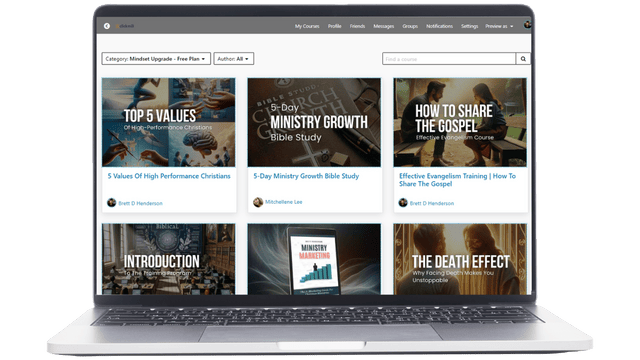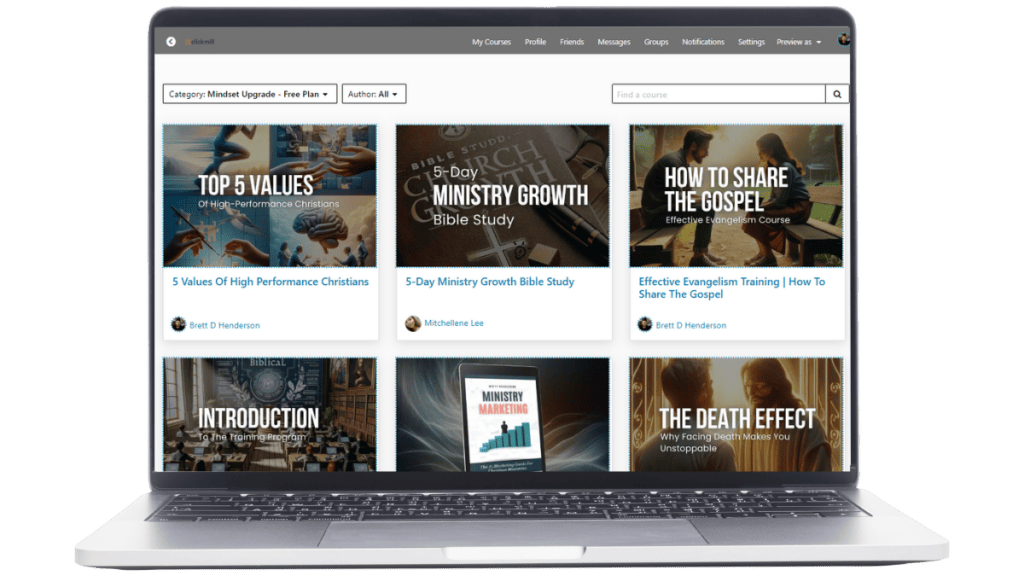Church ads can reach new members using Facebook Ads or Google Ads. Facebook Ads are great for community engagement and top-of-funnel awareness. Google Ads target active seekers, fitting well in the middle-to-bottom of the funnel. Both platforms offer strong audience targeting, but the best strategy combines them for maximum reach and impact.
If you are wondering if Facebook Ads or Google Ads is better for your church ads, then this post is exactly what you are looking for.
Let’s jump right in!
Church Ads Section 1: Platform User Expectations
People using different digital platforms have different expectations about what their experience will be like. It’s important that you understand what these expectations are because people engage with ads differently on different platforms based on these expectations.
Facebook Ads For Churches: The expectation users bring to Facebook is similar to those that they may bring to a party. When people are on Facebook, they expect to go wherever the wind takes them. They don’t usually intend on doing anything specific.

Whether they know it or not their plan is to bounce around from post to post. This means Facebook users are most susceptible to branding campaigns, impulse decisions, and impulse purchases.
- Branding is NOT usually the first or most efficient way ministries can use their advertising budgets. Usually, there are more effective strategies you can begin with but we will talk more about this later.
- Impulse purchases are any purchase decisions that an individual can justify making RIGHT NOW without speaking to anyone else about it. The dollar value of impulse purchases varies from person to person but they are generally smaller purchases.
- Impulse decisions are decisions that can be followed up on and completed RIGHT NOW with no further commitment. People on Facebook are not typically willing to commit to long-term decisions or actions that require follow-up later that day or week.
Impulse purchase example: “Get Your Nicknack Totally FREE – All You Pay Is Shipping!”.
None of this is intended to be all-encompassing, this is just what we have found to generally be the case after spending millions of dollars in advertising.
Google Ads For Churches: The expectations users bring to Google is similar to someone going to a mall.

The mall is the medium that the shopper walks through in order to reach the destination that will solve a problem they have.
They walk through the mall hallways, go into the shoe store, buy what they need and go home. The intention of the Google user is to get a predefined problem met so they can move on to something else.
Get 20+ online christian business training courses Free For 1 Month!
Grow A God Honoring Business With 20+ Courses, Weekly Live Coaching Calls, Live Group Chat, & More! Get Your First Month For FREE!

The Founder Of Clickmill Teaches You How To Find Biblical Success In Business.
This often means people searching Google are ready and willing to take action if they find a website that they feel they can trust and that will meet their needs.
Consider Amazon for example. Why do you shop on Amazon?
- You trust amazon
- Amazon always meets your needs.
The same is true with Google.
People searching Google to get their needs met are NOT likely to make impulsive purchases because they went to Google with the intention of making a purchase.
Google users are more likely to make mid to large-sized transactions. They are also more willing to make longer-term commitments or commitments that will be followed through on in the future.
Church Ads Section 2: Location On The Marketing Funnel
In digital advertising and marketing the terms “cold”, “warm” and “hot” are frequently used to describe the level of interest, comfort, or susceptibility a specific audience has to a particular marketing campaign.
Cold/Warm Example: A “cold email list” is a list of people who aren’t expecting to hear from you and will most likely write you off as spam. When a digital marketer “warms up” an email list, they actively create content they know will meet the deeply felt needs of the specific audience contained in the email list. They then send the audience this information for free which builds the level of trust the potential customers have with the brand the marketer represents.
As the emails list gets warmer and trust has been established, the marketer can begin calling his email audience to action by asking them to take specific actions online.
With that example, let’s look at how warm the audiences are with respect to Facebook ads for churches and Google ads for churches.
Get 20+ online christian business training courses Free For 1 Month!
Grow A God Honoring Business With 20+ Courses, Weekly Live Coaching Calls, Live Group Chat, & More! Get Your First Month For FREE!

The Founder Of Clickmill Teaches You How To Find Biblical Success In Business.
Facebook Ads For Churches: As we have discovered, Facebook users are at a party. They are about as motivated to do something productive as anyone who is enjoying time with their friends and family.
In most cases, this would be considered a cold audience unless they already have some form of connection or relationship with your ministry.
These audiences may take a little longer to get warmed up to your ministry’s advertisements. But that of course doesn’t mean it can’t be done. It’s just important to focus on your Facebook advertising strategy at the right time in your church ads strategy.
Google Ads For Churches: On the other hand, many Google users are actively looking for solutions. They want the clearest, fastest, most trustworthy resolution to their problem and they wanted it yesterday.
Many people searching Google (depending on what they are searching for) can be considered “warm” or “hot” audiences.

Warm and hot audiences can often be brought into your ministry website with one click of an ad at the top of the Google Search results and are then willing to sign up, click on your call to action- “save my seat”, make a purchase, etc.
If you are enjoying this post – you will really love our ultimate guide to church marketing titled, Digital Marketing For Churches: #1 Church Marketing Guide.
Section 3: Inbound Vs Outbound
When you advertise to people who are actively looking for you, you are doing inbound advertising. When you leave your website to chase people who don’t know who you are and aren’t looking for you, this is outbound advertising.
Typically, inbound advertising is the fastest and least expensive way to get quick results. After all, this audience is actively looking for you. On the other hand, outbound marketing can give your ministry a much larger audience to pursue.
Both have their place in a well-planned advertising strategy. Let’s see where Facebook ads for churches and Google ads for churches fall with respect to inbound vs outbound advertising.
Facebook Ads For Churches: Users on Facebook are happily going about their business when your ad comes along and attempts to convince them to come over to your website and do something else.
Maybe you want them to “Save My Seat” for Sunday service. Maybe you want to get them to sign up for a free download or to watch a sermon. In any case, these users weren’t looking for you, and had no intention of doing any of the things you might ask them to do.
This is outbound advertising.
Get 20+ online christian business training courses Free For 1 Month!
Grow A God Honoring Business With 20+ Courses, Weekly Live Coaching Calls, Live Group Chat, & More! Get Your First Month For FREE!

The Founder Of Clickmill Teaches You How To Find Biblical Success In Business.
This means it can often be more difficult to get people to take specific action from Facebook. When the goal of your advertising is to get people to go to your website and sign up, you essentially show up at a party with a big sign that says to go on over to church.
Again, this is not to say that this won’t ever work, but it can be an uphill battle. What is often more effective on Facebook is showing up to the party with the intention of branding.
Show them ads that interest your specific targeted audience. Get them to engage with posts and keep your ministry at the top of their mind.
When they decide they want to engage with a product or service like yours, you will be at the top of their mind and that’s when they will come looking for you.
This is a very effective marketing strategy but it’s NOT usually the fastest or most effective bang for your advertising dollar.
Google Ads For Churches: As we discovered, Google searchers are often highly motivated to get something done.

If you are advertising a “Save my seat” page on your ministry website to people looking up “church near me” on Google, there is a HIGH probability people will sign up.
Many people who look up “Near Me” related searches on Google end up getting directly in their car and showing up at their destination within one hour.
This is inbound advertising. This means the audience size is usually smaller but much more motivated to take action.
When you are searching Google for a good restaurant, how long is it until you get in the car and head out? If you’re like me, I usually start searching for food about the time I get hungry. You can bet I’ll be jumping in the car pretty quickly.
This is also true for many church-related searches that happen online within one hour of your Sunday church services.
Get 20+ online christian business training courses Free For 1 Month!
Grow A God Honoring Business With 20+ Courses, Weekly Live Coaching Calls, Live Group Chat, & More! Get Your First Month For FREE!

The Founder Of Clickmill Teaches You How To Find Biblical Success In Business.
For this reason, many ministries can have relatively small advertising budgets and see results using Google Ads.
Section 5: Audience Targeting Methods
Facebook Ads For Churches: One of the clear advantages of Facebook ads is the number of in-depth ways you can target your audience. Facebook Ads has in-depth demographic targeting. This means the better you know your audience the more effectively reach them on Facebook.

With Facebook ads, you can target audiences based on geographic location, age, gender, interests, and behaviors. You can also choose to reach them via news feeds or right on the Facebook app.
Google Ads For Churches: While Google Ads has begun to implement more demographic targeting features, Google Ads primarily uses keyword targeting. Keyword targeting is the practice of choosing keywords that people typically type into a Google search to find something.
In the image below, you can see how many times every month each keyword is searched (these are nationwide in the United States)
As you can see, there are a lot of people looking for a church to visit every Sunday.
But there are keywords for EVERYTHING. If you want to reach Catholics in the Washington DC area with a church ad, You could choose “Washington DC catholic mass schedule.” Or if you want to reach young fathers with children under 10 years old on Google Ads, you might use “best Christian preschools near me” as your keyword phrase.
In either case, it’s not as granular as targeting based on demographics but is more effective due to the large volume of searches related to those keywords that occur each month.
Get 20+ online christian business training courses Free For 1 Month!
Grow A God Honoring Business With 20+ Courses, Weekly Live Coaching Calls, Live Group Chat, & More! Get Your First Month For FREE!

The Founder Of Clickmill Teaches You How To Find Biblical Success In Business.
One interesting advantage of using Google ads for churches is they have a feature called the Google Display Network that allows you to reach almost anyone on the Internet using their display network.
Section 6: The Best Church Ads Platform
Let’s do a quick recap before I give you my opinion on which platform is best for Church ads.
Facebook Ads For Churches: Facebook ads are excellent at getting your audience to engage with your content on Facebook or make impulse decisions like downloading your app, signing up for a free download that takes them just a few minutes. You can have them engage with posts for branding purposes. Facebook is a great place to find and appear to new people who aren’t looking for you but may be willing to hear from you anyway.
Google Ads For Churches: Google ads allow you to get results very quickly and many times without spending much at all. This makes it possible for ministries to see results before their advertising budget runs out if they are careful about the keywords they target.
So which is better? Neither. Both platforms should be used to strategically take advantage of that platform’s strengths. This means you need to have a solid advertising plan, and by extension, your ministry should have a thought-through marketing strategy.
If you would like to read more on creating an in-depth marketing strategy you can see our article: Digital Marketing For Churches: The Worlds #1 Online Church Marketing Guide.
Section 7: Church Ads Strategy Conclusion

While there is no one size fits all church ads strategy, here is one that seems to be a good starting point for ministries with a small to mid-sized advertising budget.
Get 20+ online christian business training courses Free For 1 Month!
Grow A God Honoring Business With 20+ Courses, Weekly Live Coaching Calls, Live Group Chat, & More! Get Your First Month For FREE!

The Founder Of Clickmill Teaches You How To Find Biblical Success In Business.
1 – Conversion Focused Google Ads: Start out with a low advertising budget on Google Ads where you can begin to capture all of the highly motivated people searching for your church. Track your data and show that this strategy operates without losing money for your church while increasing attendance. (Commitment Focused Ad)
2 – Conversion Focused Facebook Ads: Take the demographic data you gather in your successful Google Ads campaign and begin targeting specific groups of people on Facebook who you already know are at a high likelihood of taking action. (Commitment Focused Ad)
3 – Retargeting Ads: It may now be time to begin creating retargeting ads. These are ads that are triggered when someone visits your ministry website but DO NOT take your desired action. Retargeting ads then begin following your audience around the internet. This ensures that the audience (who you already know has a high degree of success) will be continually targeted all over the internet.
4 – Branding Focused Ads: If all of these campaigns are up and running and your church is still wanting to increase website traffic, sign-ups, etc., it’s probably time for branding ads. Branding ads CAN be done on both Facebook Or Google. It all depends on where your audience likes to hang out. Here are some of the options you have for branding. Google enables advertisers to show image ads all over the internet. Google Ads also enables you to use videos to advertise on Youtube. Facebook has a number of ad types that enable you to show up in front of your audience consistently on Instagram, Facebook, and other sites around the internet.
If you would like to read a bit more deeply on how to know if your advertising campaigns are operating successfully, I discuss how to calculate the success of your Church Ads in our article: Church Advertising: The Ultimate Beginners Guide To Church Ads
CHURCH ADS FAQS
Facebook Ads are more suited for branding and impulse decisions, as users on Facebook are generally not looking for something specific and are more open to discovery. Google Ads, on the other hand, cater to users actively searching for solutions, making them more suitable for targeted, intention-driven advertising.
Users on Facebook have a casual, browsing mindset, similar to being at a party, making them receptive to branding and impulse decisions. Google users are more like shoppers at a mall, looking for specific solutions, making them more responsive to direct, solution-oriented ads.
Understanding the marketing funnel is crucial as it helps in identifying the warmth of the audience. Facebook users are typically a colder audience, requiring more effort to warm up to a church’s ads. Google users are often a warmer audience, more ready to take immediate action.
Churches should consider using both platforms strategically, leveraging the strengths of each. Google Ads can be used for immediate, conversion-focused campaigns, while Facebook Ads can be effective for long-term branding and reaching new audiences.
For Google Ads, churches should focus on conversion-focused campaigns targeting highly motivated searchers. On Facebook, churches can start with demographic targeting for specific groups and then move to retargeting ads and branding-focused campaigns to build a consistent presence.
That brings us to the end of this post on Facebook Ads Vs Church Ads.
Will you begin with Facebook Ads or Google Ads? Let us know in the comments!


Responses